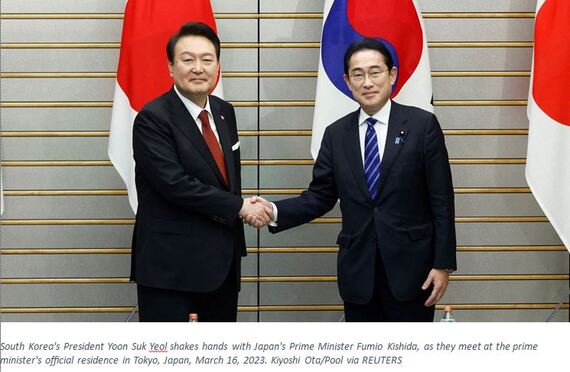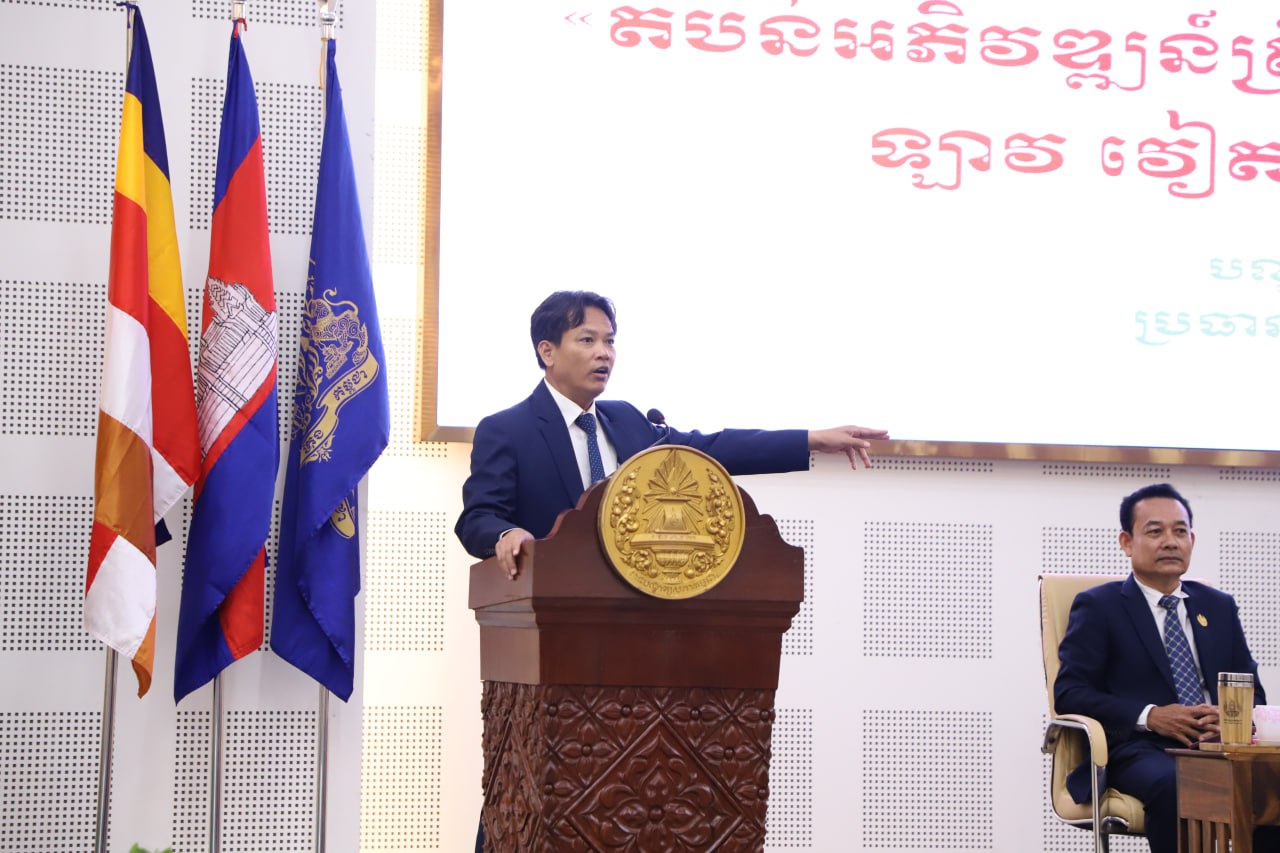Japan and South Korea share a protracted and complicated history of hostility. Following Japan's 1910–1945 rule of Korea, which included forced labor and sexual slavery, tensions increased. Both nations have worked hard in recent years to put their difficult past behind them and forge stronger ties. However, there have been a number of obstacles, including disputes over territorial claims and business-related difficulties. This article will look at the history of the connection between South Korea and Japan, the difficulties that have emerged, and the potential future for these two countries to forge a friendly and mutually beneficial partnership.
The long-standing animosity between South Korea and Japan
A long-standing enmity between South Korea and Japan that extends back to the early 20th century has complicated their relationship. The colonization on Korea by Japan between 1910 and 1945, which was characterized by violent persecution, forced labor, and other violations of human rights, can be linked to the origins of this hostility[1].
Following World War II, Japan made amends for its deeds, made restitution, and the two nations established diplomatic ties. The relationship between the two nations has remained tense since the past's wounds have not completely healed.
The topic of "comfort women" a euphemism used to denote women who were forced into sexual slavery by the Japanese military during World War II, is one of the major issues of dispute between the two nations. A more sincere apology from Japan as well as financial support for the victims have been asked by South Korea [2].
Other difficulties include debates about how a group of tiny islands should be portrayed in school textbooks and territorial conflicts over that nation. While there have been efforts to repair relations between South Korea and Japan, such as the signing of a treaty in 2015 intended to resolve the issue of the "comfort women," progress has been slow and both sides continue to harbor mistrust of one another[3].
It will take a concerted effort from both nations to acknowledge the past, resolve remaining issues, and strive toward a future of mutual respect and understanding in order to overcome this historical hatred.
The roots of the conflict: History and politics
Political tensions and a long history of hostility between South Korea and Japan have complicated their relationship and been difficult to resolve. The subject of Japan's colonial authority over the Korean Peninsula from 1910 to 1945 is at the core of this conflict. Koreans were subjected to sexual slavery, forced labor, and other forms of tyranny at this time. These crimes against humanity have deeply damaged the Korean psyche and continue to fuel animosity and hostility toward Japan[4].
The problem with Japan's management of its wartime heritage adds to the strain. Japan has been charged with minimizing its wartime atrocities and refusing to accept accountability for the pain it inflicted. As a result, there have been protests worldwide and in South Korea as well as diplomatic difficulties between the two nations.
The violence has also been exacerbated by the political environments in both nations. Both countries have strong nationalist emotions, and officials on both sides pander to their constituencies by adopting a hostile tone toward the opposing nation. Leaders have found it challenging to come to an understanding and work toward resolving the historical and political differences that separate them as a result.
Attempts have been made to strengthen ties between South Korea and Japan despite these obstacles. On matters like commerce and security, there have been diplomatic discussions, and some advancements have been achieved. However, recent events that rekindle old hostilities frequently cast a shadow on these attempts. It is unclear if South Korea and Japan will be able to forge a friendly relationship, but it is certain that doing so will require a dedication to addressing the political and historical causes of the conflict[5].
Current issues: Territorial disputes and forced labor compensation
History-based hostility has harmed the relationship between South Korea and Japan, and there are still a number of problems that need to be fixed. Territorial disputes are one of the most significant current challenges that continue to affect their relationship. The Dokdo/Takeshima Islets, which are situated in the Sea of Japan (East Sea) between South Korea and Japan, are claimed by both nations. Tensions between the two nations have been caused by this long-running territorial dispute, which has been going on for decades [6].
The controversy regarding compensation for forced labor also still affects their relationship. Many Koreans were compelled to labor in Japan's mines and industries during World War II, when many of them endured hazardous and terrible working conditions. Japan did not compensate these laborers and their families following the war. There have been requests in recent years for Japan to compensate the remaining forced laborers and their families, but the Japanese government has resisted these calls.
It has been challenging for South Korea and Japan to forge an amicable relationship as a result of these problems. But there have been initiatives to settle these disputes, such as diplomatic discussions and international arbitration. Whether these attempts are effective remains to be seen, but there is optimism that both nations may put their long-standing hostility behind them and forge a constructive partnership.
The impact of historical animosity on the two countries
The long-standing hostility between South Korea and Japan is well-documented and firmly anchored in each country's past. A turbulent relationship between the two nations for many years has had a big impact on their economic, political, and cultural relationships.
The legacy of Japan's colonial authority over Korea at the beginning of the 20th century is one of the main causes of this hostility. During this time, the Japanese perpetrated numerous atrocities on the Korean people, including forced labor, sexual enslavement, and cultural repression. This has left a lasting psychological scar on the Korean people and stoked anti-Japanese animosity[7].
On the other hand, Japan has also experienced the effects of historical hostility, particularly in the form of censure and condemnation for its actions during World War II from Korea and other nations. As a result, Japan has developed a sense of victimization and defensiveness, which makes it challenging for the nation to face historical wrongs and advance toward reconciliation.
History-based hostility between the two nations has had a major impact on everything from trade and diplomacy to cultural interchange and tourism. The 2015 deal with the issue of comfort women was one of several recent attempts to strengthen ties between the two countries, but there is still a long way to go before a harmonious relationship can be built. To resolve the problems from the past and provide the groundwork for a better future, it will take consistent effort from all parties.
Efforts to reconcile: Diplomacy and cultural exchange
Through diplomatic and cultural exchange, efforts have been undertaken to reunite South Korea and Japan. To address the enduring concerns, diplomatic efforts have included high-level summit talks and consultations between government officials. Due to the intricate nature of the historical hostility between the two countries, these efforts have, nevertheless, frequently yielded contradictory outcomes.
The path of reconciliation has also included major cultural interactions. Numerous cultural activities have been planned to encourage respect for and understanding of other people's cultures. These consist of, among others, academic exchange programs, art shows, and music festivals. These cultural exchanges have aided in closing the gap between the two countries and laying the groundwork for respect and understanding to exist between them.
Additionally, interpersonal interactions have been crucial to the process of reconciliation. NGOs and other groups from the civil society have been working to improve ties between the citizens of the two nations. To foster communication and mutual understanding between the two countries, these groups have been holding joint workshops, seminars, and other events.
Although progress has been made in the reconciliation efforts, there are still many fundamental concerns that need to be resolved. The diplomatic and cultural endeavors, however, have been a positive step in developing a positive connection between South Korea and Japan.
Public opinion in South Korea and Japan about each other
The level of public opinion in South Korea and Japan toward one another is a key determinant of how well bilateral ties are doing. Negative impressions of one another in both countries are a result of past hostility and unresolved problems. Due to Japan's colonialism of the Korean peninsula from 1910 to 1945 and the forced labor of Korean citizens during World War II, there is a strong anti-Japanese sentiment in South Korea. In South Korea, the issue of "comfort women," or Korean women who were coerced into prostitution by the Japanese soldiers, has likewise caused controversy and heightened anti-Japanese sentiment[8].
On the other hand, there is a perception in Japan that South Koreans are unwilling to put the past behind them and are too critical of Japan's past deeds. The decision of the South Korean government to strike Japan from its list of reliable commercial partners and the ongoing controversy over the remuneration of Koreans who were compelled to work as forced laborers during World War II have both contributed to this view.
It's crucial to remember that public opinion in either nation is not uniform. There are many in South Korea and Japan who support closer ties and think the two nations should cooperate to confront shared issues like North Korea's nuclear program and China's expanding influence in the area[9].
Ultimately, fostering mutual understanding and respect will require a determined effort by government leaders and civil society organizations in both countries. The shared history and cultural heritage of South Korea and Japan can be highlighted through cultural exchanges, educational initiatives, and collaborative projects.
Can the two governments work together to improve their relationship?
A complex history of colonization and war, as well as historical hostility, have soured relations between South Korea and Japan. However, cooperation between the two governments is essential if the relationship is to develop better.
There have been initiatives to strengthen diplomatic ties between the two nations in recent years. For instance, in 2018, Japanese Prime Minister Shinzo Abe and South Korean President Moon Jae-in met for the first time in over a year and decided to strive to strengthen their nations' ties.
There are still a lot of obstacles to be overcome, though. The ongoing issues regarding the compensation for Korean women who were coerced into sexual slavery by Japan during World War II are a significant problem. It is now challenging for the two nations to advance because of this issue, which has caused boycotts of Japanese goods in South Korea[10].
Additionally, there are problems with territorial disputes and historical texts that present various interpretations of their shared history.
Despite these difficulties, it is crucial that the two governments continue to strive for a better partnership. This can be accomplished by enhancing economic relationships, conducting cultural exchanges, and using diplomacy. The two nations can only end their long-standing hostility and forge a cordial relationship by working together and understanding one another.
Can the two societies overcome their differences?
History-based hostility has harmed South Korea and Japan's relationship for many years. Tensions between the two nations stem from Japan's 1910–1945 colonial control of Korea, which saw a number of crimes committed against the Korean people by the Japanese government.
Many South Koreans are still deeply affected by the scars of the past, despite efforts by both governments to mend fences. The ongoing debate about "comfort women," Korean women who were coerced into sexual servitude by the Japanese military during World War II, is evidence of this.
Many individuals in both nations, though, see the value of putting these old grudges behind us and forging ahead with a more peaceful relationship. Particularly the younger generations are frequently better at moving past the past and concentrating on the present.
Both nations must participate in frank and open discussion, own past wrongs, and work toward reconciliation if they are to resolve their problems. This will take a lot of time and work, but it is necessary if South Korea and Japan want to build a friendly and productive relationship in the future[11].
Lessons from other countries with similar experiences
There are important lessons to be gained about overcoming historical hostility from other nations who have gone through comparable experiences. For instance, despite having a long history of hostility, Germany and France were able to forge peaceful and successful ties in the years following World War II. This resulted through a process of reconciliation that included admitting wrongs from the past, making amends, and establishing powerful economic and political linkages. Similar to this, South Africa overcame apartheid to become a democracy through a process of truth and reconciliation that included admitting previous wrongdoings and pardoning those who admitted their crimes.
In order to address their shared historical concerns, Japan and South Korea could take inspiration from these cases and implement comparable strategies. This might entail accepting responsibility for past wrongs, compensating victims, and encouraging cooperation and cross-cultural contact. It will take some time, persistence, and a willingness to engage in an open and honest discourse, but it is ultimately possible to forge an amicable and productive partnership between these two significant regional powers. Japan and South Korea may advance toward a more promising and peaceful future by taking lessons from the past.
In conclusion, the ties between South Korea and Japan are complicated and have been tainted by long-standing hostility from the past. Although it might seem like a difficult endeavor, it is not impossible for the two countries to develop a more harmonious relationship. To achieve reconciliation, all parties must consciously choose to accept past wrongs and put forth effort [12].
Recognizing the effects that their acts have had on each other's nations and people is crucial for South Korea and Japan. Addressing subjects like the comfort women debate and the forced labor of Korean workers under Japan's colonial domination of Korea is part of this.
Furthermore, encouraging cultural exchanges through initiatives like linguistic and educational programs could promote a greater understanding and respect for one another's cultures.
It's crucial to remember, though, that the road to a more harmonious relationship won't be easy, and there can be roadblocks along the way. To develop trust and provide the groundwork for a successful relationship, both parties will need to commit over an extended period of time.
Overall, though it may not be simple, putting the past behind South Korea and Japan is a realistic aim that might have a positive impact on both nations and their citizens. As a good friend of both countries, Cambodia is very pleased to see the good relations between Korea and Japan.
-----------------
[1] How Japan Took Control of Korea, could be found through the following link: https://www.history.com/news/japan-colonization-korea
[2] Criminology, Sociology and Policing at Hull, could be found through the following link: https://crimsoc.hull.ac.uk/2021/08/17/unrepaired-wrongs-comfort-women/
[3] The Rough State of Japan–South Korea Relations, could be found through the following link: https://www.nbr.org/publication/the-rough-state-of-japan-south-korea-relations-friction-and-disputes-in-the-maritime-domain/
[4] Resolving Tensions Between South Korea and Japan: An Essay Series, could be found through the following link: https://www.usip.org/programs/resolving-tensions-between-south-korea-and-japan-essay-series
[5] What’s Behind Japan and South Korea’s Latest Attempt to Mend Ties?, could be found through the following link: https://www.usip.org/publications/2023/03/whats-behind-japan-and-south-koreas-latest-attempt-mend-ties
[6] Islands of ire: The South Korea–Japan dispute, could be found through the following link: https://www.lowyinstitute.org/the-interpreter/islands-ire-south-korea-japan-dispute
[7] How Japan Took Control of Korea, could be found through the following link: https://www.history.com/news/japan-colonization-korea
[8] Survey finds 60% of South Koreans oppose Japan wartime labor dispute resolution, could be found through the following link: https://www.japantimes.co.jp/news/2023/03/11/national/politics-diplomacy/japan-south-korea-wartime-labor-public-opinion-polls/
[9] South Korea and Japan: A milestone meeting of frenemies, could be found through the following link: https://www.bbc.com/news/world-asia-64962733
[10] Analysis: With Abe’s exit, Seoul seeks to mend Japan ties, could be found through the following link: https://apnews.com/article/shinzo-abe-global-trade-seoul-international-news-south-korea-4e076944751ab7fd9d96b43943291e3b
[11] South Korea, Japan Struggle to Overcome Mistrust While Facing Common Threats, could be found through the following link: https://www.voanews.com/a/south-korea-japan-struggle-to-overcome-mistrust-while-facing-common-threats/6705160.html
13] Mended Ties Between Japan and South Korea Would Boost Regional Security, could be found through the following link: https://www.usip.org/publications/2022/07/mended-ties-between-japan-and-south-korea-would-boost-regional-security
--------------------
Dr. Seun Sam is a policy analyst of the Royal Academy of Cambodia. This article is dedicated to the good friends of Cambodia namely Korea and Japan.






